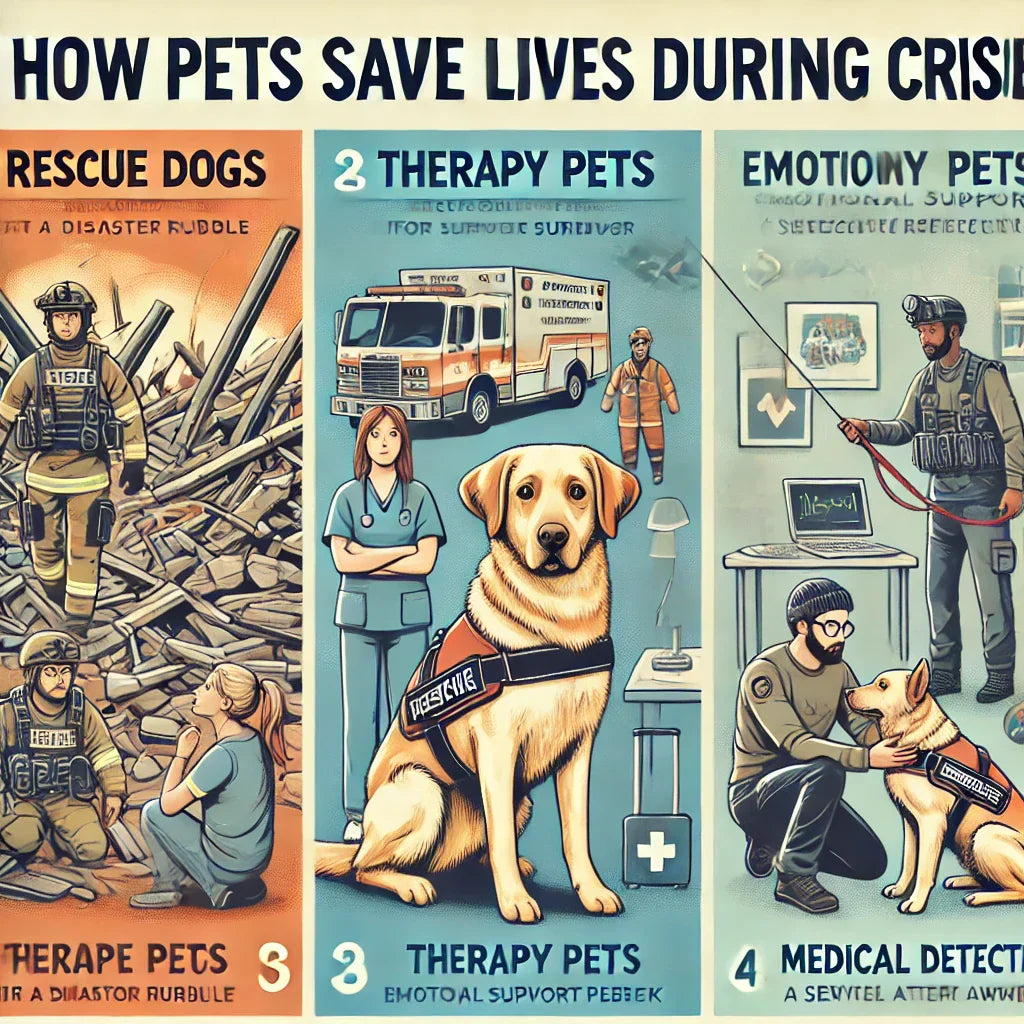
The Unbreakable Bond: How Pets Save Us in Times of Crisis
Share

Introduction: How Do Pets Become Lifesavers in a Crisis?
In moments of crisis, pets provide more than just companionship—they save lives. Whether it’s rescue dogs pulling people from danger, emotional support animals easing PTSD, or therapy pets aiding recovery, the impact of pets in crises is undeniable.
Scientific research shows that pet companionship benefits mental health, lowers stress, and even helps in emergency situations. From dogs detecting health emergencies to animals comforting disaster survivors, their lifesaving role extends far beyond what many realize.
This article explores the science-backed benefits of pets in crises, shares real stories of pets as heroes, and explains how the human-pet bond provides emotional and physical resilience during tough times.
🐾 Experience the healing power of the human-pet bond and discover the lifesaving role of pets in crises.
1. How Do Pets Save Lives During Emergencies?
Rescue Dogs: Heroes in Action
Search-and-rescue dogs have been saving lives for decades. In natural disasters, earthquakes, or avalanches, these highly trained canines:
✔ Detect trapped survivors under rubble.
✔ Alert rescue teams to missing people.
✔ Navigate dangerous terrains where humans struggle.
One famous case is Frida, the Labrador Retriever who saved dozens of lives during Mexico’s 2017 earthquake. These dogs show how service animals in crisis are essential for survival.
🐶 Support rescue shelters that give neglected pets a second chance by adopting trained rescue animals.
2. Therapy Pets: Emotional Support in Times of Crisis
How Therapy Pets Help in Mental Health Crises
In the aftermath of traumatic events, therapy pets help people recover by:
✔ Lowering stress and anxiety in disaster survivors.
✔ Providing emotional support for PTSD patients.
✔ Encouraging communication in crisis-affected individuals.
Studies show that pet companionship benefits mental health by reducing cortisol levels and boosting oxytocin, the "love hormone" that calms stress.
🐕🦺 Discover the emotional rewards of adopting a neglected pet and see how pets provide healing.
3. Emotional Support Pets: Providing Comfort & Stability
How Emotional Support Pets Help in PTSD & Anxiety Disorders
For individuals dealing with anxiety, depression, or PTSD, emotional support animals (ESAs) offer:
✔ Unconditional love and stability.
✔ Reduced loneliness in crisis situations.
✔ A sense of routine and security.
For veterans with PTSD, emotional support dogs have proven to lower panic attack frequency and improve overall well-being.
🐾 Read inspiring stories of pets overcoming trauma through rehabilitation and see how therapy transforms lives.
4. How Pets Detect Health Emergencies Before Humans Do
Some animals have an uncanny ability to detect medical emergencies, including:
✔ Dogs sensing seizures before they happen.
✔ Cats detecting low blood sugar in diabetics.
✔ Pets alerting owners to heart attacks or strokes.
Research confirms that pets detect human health emergencies through smell and behavioral cues, making them lifesaving companions.
🐕 Be prepared for emergencies with these life-saving strategies and ensure your pet can respond when needed.
5. How Pets Strengthen the Human-Pet Bond in Crises
Survivors Who Found Strength in Their Pets
🐾 In Hurricane Katrina, many families refused evacuation without their pets, highlighting the deep human-pet bond.
🐾 Therapy pets helped comfort survivors of the 9/11 attacks, offering silent emotional support in the wake of tragedy.
🐾 Studies show that having a pet during a crisis reduces PTSD symptoms and provides emotional grounding.
🐕 Learn how fostering can transform the lives of neglected pets and experience the power of pet companionship.
How Pets Save Human Lives: The Science Behind Their Abilities
Natural Warning Systems
Scientific research from the University of Denver reveals that pets possess extraordinary abilities to detect danger before humans:
- Detection of environmental changes
- Recognition of human physiological shifts
- Sensitivity to atmospheric pressure variations
- Early warning for natural disasters
The Physiological Impact
Studies published in the Journal of Psychosomatic Research demonstrate measurable benefits:
- Oxytocin release during pet interactions
- Reduced cortisol levels in crisis situations
- Lowered blood pressure during stress events
- Enhanced cardiovascular recovery rates
Scientific Evidence of the Human-Pet Bond
Research Findings
Recent studies demonstrate:
- 65% stress reduction in pet owners during crises
- Faster heart attack recovery rates
- Improved mental health outcomes
- Enhanced emergency response capabilities
Expert Insights
Leading veterinary professionals confirm:
- The role of pets in crisis detection
- Impact on human survival rates
- Importance of the human-animal bond
- Future of animal-assisted crisis response
Conclusion: Why Every Crisis Response Plan Should Include Pets
From rescue operations to mental health therapy, pets play an irreplaceable role in crises. Their ability to save lives, provide emotional support, and detect health emergencies makes them true heroes.
